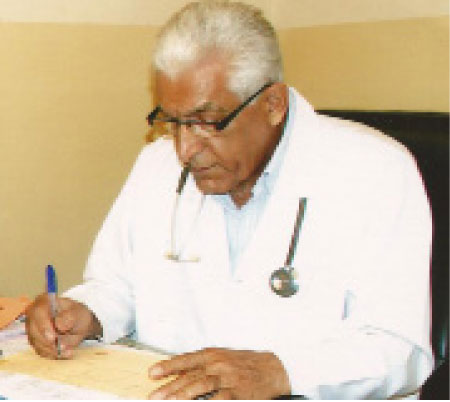
A miscarriage is any pregnancy that ends spontaneously before the foetus can survive. A miscarriage is medically referred to as a spontaneous abortion.
The World Health Organization defines this unsurvivable state as an embryo or foetus weighing 500 grams or less, which typically corresponds to a foetal age (gestational age) of 20 to 22 weeks or less.
Miscarriage occurs in about 8% to 20% of all recognized pregnancies, and usually occurs before the 13th week of pregnancy. With the development of highly sensitive assays for hCG levels that can detect an early pregnancy even prior to the expected next period (menstruation), researchers have been able to show that around half of all pregnancies (recognized and unrecognized) are lost. Because the loss occurs so early, many miscarriages occur without the woman ever having known she was pregnant.
Of those miscarriages that occur before the eighth week, a portion has no foetus associated with the sac or placenta. This condition is called blighted ovum, and many women are surprised to learn that there was never an embryo inside the sac. Chances of miscarriage decrease significantly once foetal heart function is detected in a given pregnancy.
A woman who may be showing the signs of a possible miscarriage (such as vaginal bleeding) may have her pregnancy referred to as a “threatened abortion.”
What causes a miscarriage, and what are the tests for the different causes?
The cause of a miscarriage cannot always be determined. The most common known causes of miscarriage in the first third of pregnancy (1st trimester) are chromosomal abnormalities, collagen vascular disease (such as lupus), diabetes, other hormonal problems, infection, and congenital (present at birth) abnormalities of the uterus. Chromosomal abnormalities of the fetus are the most common cause of early miscarriages, including blighted ovum (see above). Each of the causes will be described below.
Chromosomal abnormalities
Chromosomes are microscopic components of every cell in the body that carry all of the genetic material that determines hair colour, eye colour, and our overall appearance and makeup.
These chromosomes duplicate themselves and divide many times during the process of development, and there are numerous points along the way where a problem can occur. Certain genetic abnormalities are known to be more prevalent in couples that experience repeated pregnancy losses.
These genetic traits can be screened for by blood tests prior to trying to conceive.
Diabetes
Diabetes generally can be well managed during pregnancy, if a woman and her health care professional work closely together. However, if the diabetes is insufficiently controlled, not only is the risk of miscarriages higher, but the baby can have major birth defects. Other problems can also occur in relation to diabetes during pregnancy. Good control of blood sugars during pregnancy is very important.
Hormonal factors
Hormonal factors may be associated with an increased risk of miscarriage, including thyroid disease, and polycystic ovary syndrome (PCOS). It also has been suggested that inadequate function of the very early stages of pregnancy) may lead to miscarriage.
Infections
Maternal infection with a large number of different organisms has been associated with an increased risk of miscarriage. Foetal or placental infection by the offending organism then leads to pregnancy loss. Examples of infections that have been associated with miscarriage
Abnormal structural anatomy
Structural abnormalities can result from benign growths in the uterus called fibroids. Fibroid are benign growths of muscle cells in the uterus. While most fibroid tumours do not cause miscarriages, (in fact, they are a rare cause of infertility), some can interfere with the embryo implantation and the embryo’s blood supply, thereby causing miscarriage.
Miscarriage Symptoms and Signs
If you are having a spontaneous miscarriage, you will probably have vaginal bleeding, abdominal pain, and cramping.
·Bleeding may be only slight spotting, or it can be quite severe. Your health care practitioner will ask about how much you have bled-usually the number of pads you’ve soaked through. You will also be asked about blood clots or whether you saw any tissue.
·Pain and cramping occur in the lower abdomen. They may occur on only one side, both sides, or in the middle. The pain can also go into your lower back, buttocks, and genitals.
·You may no longer have signs of pregnancy such as nausea or breast swelling/tenderness if you have experienced a miscarriage.
What does not cause miscarriage?
It must be emphasized that exercise, working, and sexual intercourse do not increase the risk of pregnancy loss in routine (uncomplicated) pregnancies. However, in the unusual circumstance where a woman is felt by her physician to be at higher risk of spontaneous abortion, she may be advised to stop working and refrain from having sexual intercourse. Women with past history of premature delivery and other specific obstetrical conditions might fall under this category.
Are there lifestyle factors associated with miscarriage?
Smoking more than 10 cigarettes per day is associated with an increased risk of pregnancy loss, and some studies have even shown that the risk of miscarriage increases with paternal smoking. Other factors, such as alcohol use, fever, use of no steroidal anti-inflammatory drugs around the time of embryo implantation, and caffeine use have all been suggested to increase the risk of miscarriage, although more studies are needed to fully clarify any potential risks associated with these factors.
Of course, alcohol is a known teratogen (a chemical that can damage the developing foetus), so pregnant women are advised to abstain from drinking alcoholic beverages.
What are the symptoms of a miscarriage?
Cramping and vaginal bleeding are the most common symptoms noticed with spontaneous abortion. The cramping and bleeding may be very mild, moderate, or severe. There is no particular pattern as to how long the symptoms will last.
Vaginal bleeding during early pregnancy is often referred to as a “threatened abortion.” The term threatened abortion is used since miscarriage does not always follow vaginal bleeding in early pregnancy, even after repeated episodes or large amounts of bleeding. Studies have shown that most pregnancies with demonstrated fetal cardiac activity that have vaginal bleeding at 7 to 11 weeks of gestation will result in an ongoing pregnancy.
What will the doctor look for during an examination with suspected miscarriage?
A woman’s cervix might have some bloody discharge, but nothing else unusual will be characteristic of threatened abortion. Some women will have mild uterine tenderness during the manual examination of the uterus.
The doctor may look to see if the cervix is dilated and will check to see if the uterus is enlarged to an extent appropriate for gestational age of the pregnancy.
How is threatened abortion evaluated?
Pelvic ultrasound is used to visualize foetal heartbeat and to determine whether a pregnancy is still viable. The ultrasound examination can also distinguish between intrauterine and ectopic pregnancies. The doctor may also order blood levels of serial human chorionic gonadotrophin (HCG) to help determine the viability of a pregnancy if the ultrasound examination is not conclusive. During the evaluation, the woman may be advised to rest and avoid sexual intercourse (activity).
What happens during miscarriage?
The symptoms you experience will depend on the cause of the miscarriage and how advanced the pregnancy is/was so may take hours, days or even weeks to complete. Usually the foetus, placenta and blood from the uterus leave the body through the vagina. You may discover during a routine scan that there is no heartbeat, or even an empty foetal sac.
Usually, by the time bleeding begins your baby has already died, unless it is around the 6 weeks period when only a small amount of blood is lost and then there is an 80% your baby will be fine.
99% of foetal deaths occur in the first 12 to 14 weeks of pregnancy (1st trimester), although the actual miscarriage may not happen for some weeks after the baby dies. Medically this is called a ‘missed abortion’. (The baby is an “embryo” to the 8th week and a “foetus” after that.)
What treatment can a woman expect when she has had a miscarriage?
The central goal of the doctor in this situation will be to try to figure out whether the woman has passed all of the tissue from the foetus and placenta. If she has passed all the tissue, she may only require observation by medical personnel. On the other hand, a woman who has not passed all of the tissue (incomplete abortion) will usually need suction dilation and curettage (D&C) of the uterus to remove any retained products of the pregnancy.
This procedure is done with local anaesthesia, and sometimes antibiotics may be prescribed for the woman to prevent infection.
Can something be done to prevent future miscarriages?
The treatment of recurrent miscarriage depends on what is believed to be the underlying cause. This often is not as simple as it sounds. Careful evaluation may turn up several potential factors which alone or together may be responsible for the pregnancy losses.
If a chromosomal problem is found in one or both persons, then counselling as to future risks is the only option for the couple, since there is currently no method to correct genetic problems.
If a structural problem is encountered with the uterus, surgical correction could be contemplated. It should be emphasized that just because a structural abnormality is found, it does not necessarily mean that it caused the miscarriage.
Removal of a fibroid or uterine septum does not guarantee a future successful pregnancy, since the fibroid or uterine septum may not have been the cause of miscarriage in the first place.
For further information visit The Governments Hospital and Clinics throughout the country, Mother and Child Department Ministry of Health, number of NGO and Private Clinics, call on DR Azadeh Live Health Program at AFRI-RADIO every Wed from 9-9.30 am, E Mail azadehhassan@yahoo.co.uk, and text on 002207774469/3774469.


